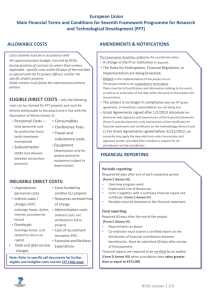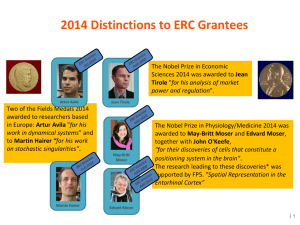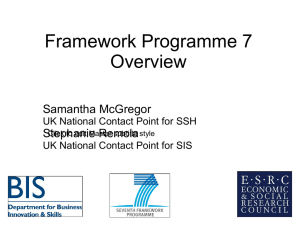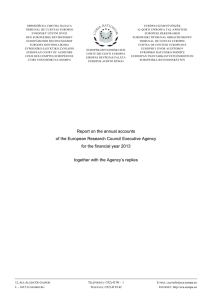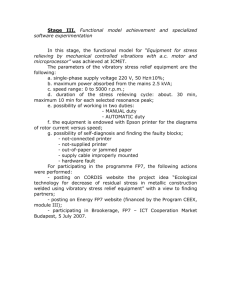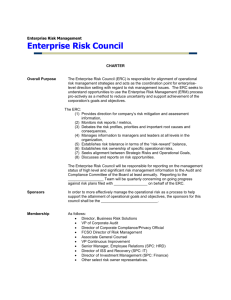Guide to ERC - University of Glasgow
advertisement
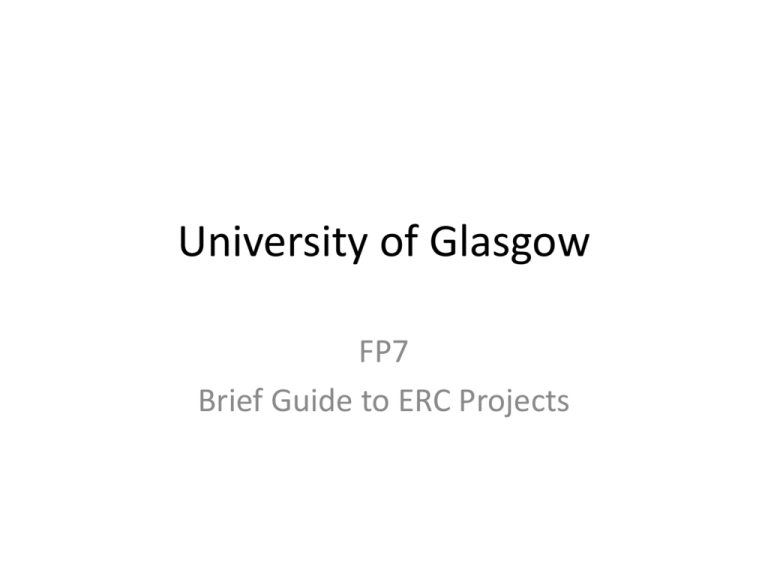
University of Glasgow
FP7
Brief Guide to ERC Projects
FP7
•
This information is intended to outline the key financial requirements of
Framework 7 (FP7) ERC grants. It is important to familiarise yourself with these
facts in order to manage your grant effectively.
•
1. Post Award Introduction to ERC programme
2. Eligible and Ineligible Costs & the Annex I Description of Work
3. Personnel Costs & Timesheets
4. EC Budget & the UFS
5. Payments from the EC
6. Reporting
7. Audit
8. Contract Amendments
1. Post Award Introduction to ERC Programme
•
European Research Council grants are new in Framework 7. ERC Grants are awarded to a single
researcher ('Principal Investigator') heading an individual research team to conduct a frontier
research project on the condition that he/she is engaged by a legally established hosting
organisation. There are two types of ERC grant:
•
ERC Starting Grants
•
ERC Advanced Grants
•
Although the two different grants have different aims and are for different recipients, from the
post-award perspective they can be treated in the same way. The below notes are to ensure you are
aware of key information necessary to correctly manage your new ERC grant.
2. Eligible and Ineligible Costs & The Annex I Description of Work
The contract with the European Commission states that in order to be eligible costs must be:
• actual and incurred by the beneficiary
• incurred for the sole purpose of achieving the project objective and its expected results, in a manner consistent with the principles of
economy, efficiency and effectiveness;
• they must be recorded in the accounts of the beneficiary; in the case of any contribution from third parties, they must be recorded in the
accounts of the third parties;
• incurred during the period of the project (exception is some costs relating to final reports can be incurred up to 60 days after the end date),
determined according to the usual management and accounting practices of the beneficiary (therefore the University’s Financial
Regulations must be followed at all times)
• and indicated in the Annex I of the Grant Agreement (i.e. if under budget the project cannot spend on something which was not initially
envisaged, simply to use up unspent funds)
Annex I
The Annex I is a key document, outlining the projects aims and deliverables, which the PI is responsible for managing. If an activity is
outlined in the Annex I it is approved by the EC and is an eligible cost to the project. If you wish to undertake an activity not
mentioned in the Annex I prior permission should be sought from your College.
On some occasions an official contract amendment may be required if the Annex I does not include necessary information (i.e. if
substantial sub-contracting is required but was not mentioned in the approved Annex I it is not possible to charge the sub-contracting
costs to the grant unless the Annex I is amended).
The following costs are ineligible:
•
•
•
•
•
•
•
•
identifiable indirect taxes including value added tax (see below for further information)
duties,
interest owed,
provisions for possible future losses or charges,
exchange losses, cost related to return on capital,
costs declared or incurred, or reimbursed in respect of another Community project,
debt and debt service charges, excessive or reckless expenditure;
costs which do not meet the above eligibility criteria are also ineligible
The particular case of VAT: VAT is an ineligible cost on FP7 grants and as such, cannot be claimed from the EC. However VAT is no
longer reclaimable from HM Revenue and Customs (as was the case for Framework 6 grants). This means that VAT incurred on FP7
grants is an additional cost which departments will need to fund from their share of departmental overheads earned. Any VAT coded
to the grant will automatically be charged to the Department’s overhead account.
3.Personnel Costs & Timesheets
FP7 allows the charging of permanent staff to EC projects for the first time. Therefore a PI’s own time can be charged to the grant.
Please note the EC are clear that Commission funding cannot give rise to a profit for the beneficiary therefore PI time can only be
charged to the EC grant if it is not being reimbursed by another sponsor currently. However, the completion of timesheets is
necessary on all FP7 projects, including ERC grants: the audit of all FP7 grants will require the verification of hours worked, even if
100% of time is to be spent on the project. Please refer to the Timesheet document for a detailed explanation. Monthly
timesheets must therefore be completed for all staff employed or charged to an FP7 grant. The Research Support Office have
designed a template timesheet which meets the EC's stringent requirements on time-keeping records and should therefore be
used (unless an existing time-keeping system already exists).
4. EC Budget & UFS
The approved budget will be set up in full on the University Financial System (UFS). When coding expenditure to the grant standard
expenditure categories such as staff costs, travel and subsistence will apply. The EC recognise that the initial budget is only an estimate
therefore virement is allowed between the different cost categories.
20% overheads on direct expenditure can be claimed and the UFS will calculate these. Overheads cannot be claimed on any
subcontracting (e.g. audit costs). The EC will reimburse 100% of eligible costs.
5. Payments from the EC
Although the full budget is set up by the Research Support Office on Agresso, the EC pay in instalments. The EC shall make an initial
pre-financing payment (of approximately 65% of the total grant). Interim payments of the Community financial contribution shall be
made corresponding to the amount accepted for each financial management reporting period, until the EC has paid 90% of the
grant, at which stage no further payment is made until the grant ends.
6.Reporting
ERC reporting is different to a standard FP7 project as the required Scientific and Financial reports are normally handled separately,
instead of both being due at the same time. Financial reports will normally be required more often than Scientific reports. Both
periodic and final reports must to be submitted to the EC. Please check Article 4 of your grant agreement for the details of your
reporting periods (when your reports are due). Reports must be submitted within strict deadlines at the end of each reporting period
(normally 60 days after period ends).
The Research Support Office will prepare the financial reports and the PI is responsible for the Scientific Reports. The EC’s Reporting
Guide for FP7 ERC awards is available here ftp://ftp.cordis.europa.eu/pub/fp7/docs/erc-guide-grantholders-partII_en.pdf (please note
section II relates specifically to reporting, starting on page 54).
7. Audit
Your financial statement (Form C) may require an audit in order to obtain a certificate on the financial statement. This replaces the
audit certificate in FP6. The requirements for audit have significantly changed in FP7. A certificate on the financial statement is only
ever required once expenditure exceeds €375,000 so projects where the EC contribution is less than this will not be audited, even at
the project end. For grants of 2 years or less then only one audit is required at the end of the project (even if €400,000 is spent in the
1st period no audit is required until the end of the project). The Research Support Office will arrange any necessary financial audits.
In addition, the EC have the right to audit the project at any stage, including up to 5 year’s after the end date, therefore all records must
be kept for at least this length of time.
8. Contract Amendments
The following situations may/will require an amendment to the Grant Agreement, if the following situation arises please
refer to the Research Support Office immediately.
Transferring the grant to a new Host Institution. ERC grants are transferable, the Commission Project Officer should be
approached at the earliest opportunity.
Change to the project duration. Any request to change the duration of the project must be submitted prior to the end date of
the project. Extensions will only be granted if clearly justified.
Changes to the Annex I Description of Work. Should the project /deliverables/activities change substantially an amendment
may be required. NB all sub-contracting must be mentioned in the Annex I so if not mentioned and required this would
require an amendment.
If you have any further questions on the information in this document please contact the Research Support Office.
